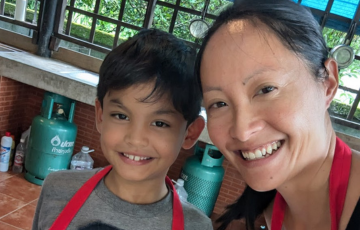The lessons and habits your child learns now will shape her health for the rest of her life. This section shows some of the ways you can help your child reach and maintain good health.
Helpful Tips:
- provide your child with a healthy range of foods following recommendations in the Canada Health Guide.
- Teach and model healthy eating habits and a positive body image.
- Plenty of exercise is essential for healthy children. Give your child lots of opportunities for play, organized team and individual sports, and active living.
- Keep your child’s immunization up to date.
- Make regular visits to your family doctor, public health nurse, eye doctor, and dentist to help ensure your child’s hearing, vision, and teeth are developing properly.
- Get prompt medical attention if your child is suffering from a serious illness.
DID YOU KNOW?
Vaccines save lives and prevent disease. Learn how your child can be immunized and when.
Active Living
For healthy, strong growth and development, children need at least 30 minutes of physical activity each day. It should be enough to make their heart beat faster, their breathing quicken, and their bodies heat up.
Encourage your child to live actively
- Model active living in your own life.
- Find physical activities your child likes. Some children are into organized sports like basketball and hockey, while others prefer less structured activities like hiking and swimming.
- Increase your family’s active living. Take the kids and the dog for a walk. Walk to school or the grocery store, instead of driving or taking the bus.
- Limit the amount of time your child is allowed to watch TV, play video games, or use the computer.
- Go outside. The freedom of all that space inspires kids to move.
Active Living Programs for Families
Central island Healthy Lifestyles Program
The Central Island Healthy Lifestyles Program - Shapedown BC helps children (6-17) and their families achieve a healthy lifestyle. Available in Ladysmith, Nanaimo, Parksville and Qualicum.
City of Victoria L.I.F.E Program
The L.I.F.E. Program provides a combination of annual credit and program savings to eligible low-income individuals and families to use towards recreational programs and services in all City recreational facilities and ten of our jointly operated centres.
Bring your completed application form to the Crystal Pool and Fitness Centre at 2275 Quadra Street, Victoria.
Please note: This is only available to City of Victoria citizens.
Visit the City of Victoria website for more details, the application form and guidelines.
Ears, Eyes and Teeth
Your child’s eyes, ears, and teeth require some special care to make sure they are strong and healthy. Hearing and vision are very important for successful learning and basic enjoyment of the world; and teeth must last a lifetime.
Your child should visit an optometrist (eye doctor) at least once every year for a vision test. Throughout the year, look for signs they may be having trouble seeing – squinting, headaches, rubbing his eyes.
Watch your child for any signs of hearing difficulties. Do they watch TV with the volume cranked? Does they seem to ignore you unless they watch you speak? Visit your public health nurse or family doctor if you suspect your child is having hearing problems.
Children should visit a dentist twice a year. In between visits, make sure your child is flossing and brushing his teeth with fluoride toothpaste. Children will need assistance to do this well until they have the manual skills equal to writing (not printing) their names.
Nutrition
Teaching children about nutrition helps them learn healthy eating habits they can keep through adolescence and into adulthood.
Influence your child’s food choices
- talk to your children about food as fuel for their bodies
- teach them how to choose foods that will give them the energy and nutrients they need
- limit the amount of high-fat, high-calorie snacks in your home - instead, keep cut fruits and vegetables, trail mix, yogurt, etc. handy for snacking
- provide nutritious snacks and meals based on the recommendations in the Canada Food Guide
- if your family follows a vegetarian, vegan or other restricted diet, consult a dietitian for advice on providing your child with optimal nutrition
- encourage your child to try new dishes, foreign restaurants and unusual fruits and vegetables
- the best nutrition comes from eating a variety of foods
- teach healthy food choices by involving your child in grocery shopping and cooking
- model healthy eating habits and a positive body image



